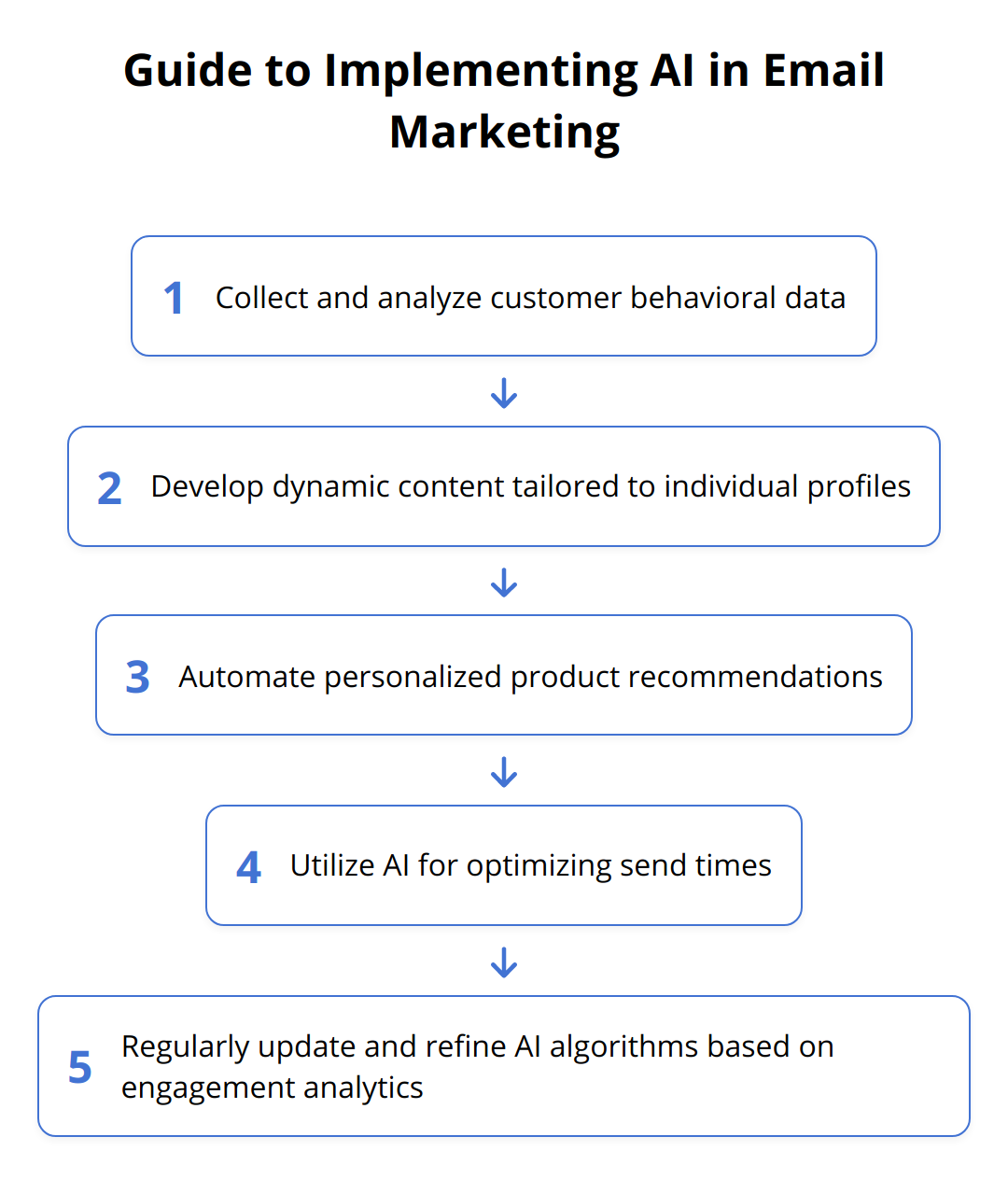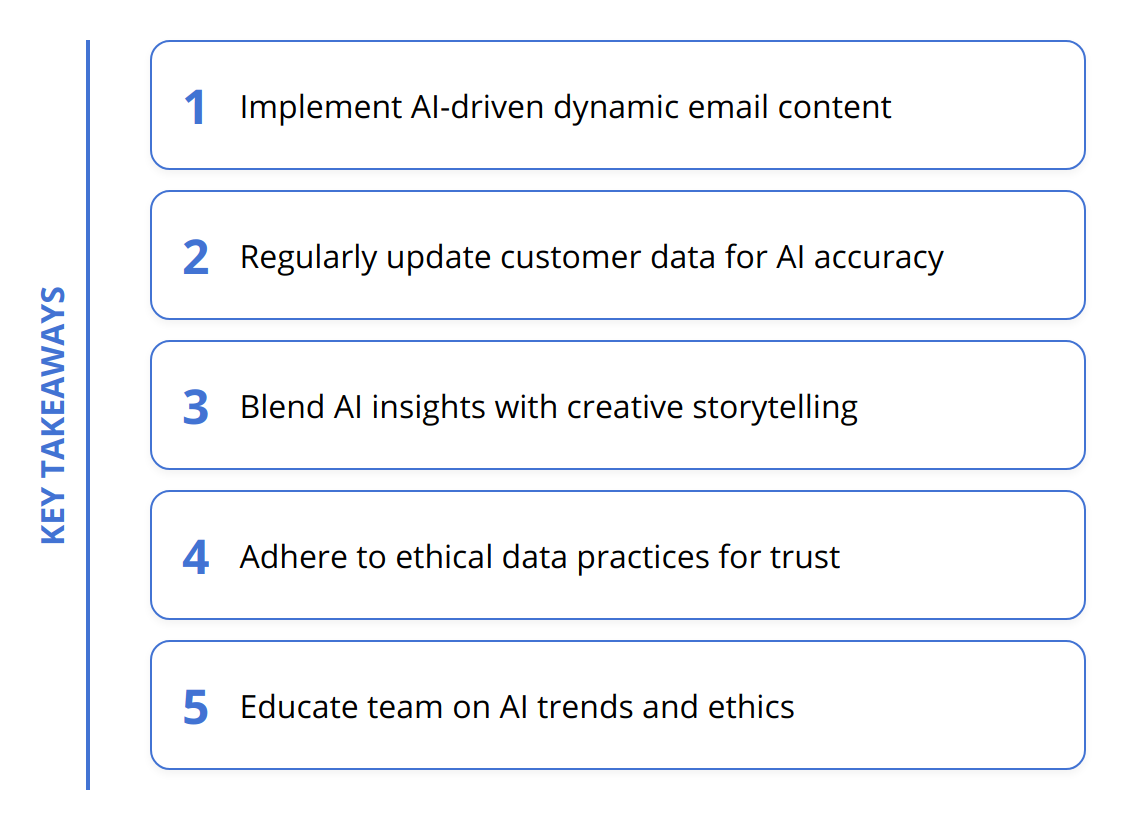We at Emplibot understand the transformative power of AI in reshaping the landscape of personalized marketing. The ability to customize experiences for consumers has revolutionized the way brands interact with their audience. AI doesn’t just open doors to immense data processing capabilities; it’s altering the very fabric of customer relationship management. Let’s explore how this technological advancement is elevating marketing strategies and the practical applications that make it so effective.
How Is AI Transforming Personalized Marketing?
Personalized marketing, once a resource-intensive endeavor, is now seamlessly executed with artificial intelligence, elevating customer experiences to unprecedented levels. Let’s dive into the specifics of how AI’s analytical prowess is fundamentally changing marketing as we know it.

Crafting Unique Customer Journeys
Artificial Intelligence harnesses vast swathes of data, deciphering patterns to create marketing strategies that resonate on an individual level. By sifting through customer interactions, purchase history, and even social media behavior, AI pinpoints exactly what each customer finds appealing. This data-driven approach allows for personalization beyond the generic “Dear [First Name]”, pushing the boundaries to suggest products a customer is likely to buy or content they will engage with. As a result, marketers are seeing engagement rates soar, with reports showing a significant boost in click-throughs and conversions when compared to non-personalized counterparts.

Fostering Brand Loyalty Through Personal Touches
Personalization isn’t just about driving sales; it’s about building relationships. A customer who feels understood is a customer who sticks around. AI excels in this realm by not only personalizing initial interactions but also by continuously learning from customer feedback and behavior. This learning results in ever more accurate recommendations and timely communication that foster a sense of loyalty. Consider how retail giants use AI to send personalized discounts on items frequently browsed by the customer, which not only tempts a sale but also strengthens the customer’s connection to the brand.
Real-time Campaign Adjustments for Maximum Impact
With real-time data analysis, AI systems can adjust marketing strategies on the fly. No more waiting for campaign end reports to tweak your approach. AI tools are now capable of altering campaign parameters in response to real-time customer interactions. For example, if an AI system notices a drop in engagement during certain hours, it can automatically reschedule sending times to align with when users are most active. This sort of agility in marketing campaigns is pivotal for staying ahead of the curve and keeping customers engaged.
Here are some quick actionable tips to leverage AI in personalized marketing:
-
Implement AI-driven tools that provide customer insights and automate personalized content creation.
-
Use predictive analytics to anticipate customer behavior and tailor marketing efforts accordingly.
-
Automate real-time adjustments in your campaigns for optimal customer engagement.
In the fast-paced world of marketing, AI is not just a tool—it’s an indispensable ally. The capacity to personalize at scale, nurture customer loyalty, and optimize campaigns in the blink of an eye is transforming the industry. By investing in AI-driven marketing strategies, brands can not only meet but exceed the personalization standards that customers now expect. If you’re aiming to stay competitive in today’s market, it’s time to embrace these AI-powered personalization capabilities. Looking for deeper insights on optimization? Optimizing your content strategy offers valuable strategies for enhancing your marketing campaigns.
How Does AI Decode Customer Insights?
The age of generic marketing blasts is long gone; today’s landscape demands nuanced understanding and precision targeting. AI is the key player on this field, offering marketers the ability to process enormous volumes of data to accurately gauge customer preferences. Brands that leverage this power are not just keeping pace—they’re setting the pace in customer engagement and satisfaction.

Artificial intelligence stands at the forefront of big data analysis, using sophisticated algorithms to unravel the complexities of customer behavior. Every click, like, and purchase is a piece of the puzzle that AI assembles to create a complete picture of individual preferences. These insights are gold for marketers aiming to deliver content that resonates on a personal level. By analyzing past behaviors, AI enables marketers to roll out campaigns with the precision of a skilled archer, hitting the bullseye of customer engagement every time.
Predictive analytics take this a step further. They’re the crystal ball of marketing, providing foresight into future customer moves. By understanding patterns and trends, AI empowers companies to anticipate consumer needs—often before consumers know themselves. This places products and services exactly where they’ll be most effective, transforming casual browsers into loyal customers. With the power to forecast upcoming trends and purchasing patterns, marketing teams can strategically allocate their resources, ensuring maximum return on investment.

Sentiment analysis is another piece of the AI personalization puzzle. This technology goes beyond mere data points and numbers; it taps into the emotions driving customer behavior. AI can sift through vast amounts of text from reviews, social media comments, and customer feedback to gauge the overall sentiment towards a brand or product. This fine-tuning of marketing messages hits the right emotional chord, creating a powerful resonance with the target audience.
For those wanting to adopt these AI capabilities in their personalized marketing, here are some practical steps to get started:
-
Integrate AI analytics platforms into your marketing tools to gain deep insights into customer behavior.
-
Employ predictive analytics software to forecast and shape your marketing strategy ahead of the competition.
-
Utilize sentiment analysis tools to adjust the tone and direction of your campaigns for maximum emotional impact.
By employing these AI-driven insights, brands can craft messages that are not just heard but felt, fostering an emotional connection that translates into genuine brand loyalty. Those wanting to explore how AI can fine-tune campaigns should dive into the principles shown in creating personalized experiences, transforming generic outreach into personalized communication.
The intersection of AI and personalized marketing is where strong customer relationships are built and brand success is cemented. This evolution in marketing isn’t just beneficial—it’s essential for any brand that looks to thrive in the oversaturated sphere of consumer attention.
Elevating Campaigns with AI Content?
Turning potential customers into brand enthusiasts is no minor feat, but with AI’s dynamic capabilities, marketers are rewriting the rulebook on engagement. The emphasis now is on smart, data-driven content that responds to the individual, not the masses. The reality is, in personalized marketing, your content must adapt or fall behind. Here’s how AI is steering the ship towards more personalized customer experiences.
Email marketing is the workhorse of digital campaigns, and AI kicks it into high gear by creating dynamic content. Dynamic content adapts to the user’s behavior, demographics, and preferences. This means an email can showcase products based on recent website interactions, adjusting offers to match customer interests. Imagine a scenario where a customer browses a selection of winter coats. Later, they open an email to find the very same coats, now with a personalized discount. The impact? The customer feels seen, and the path to purchase is not just paved but lined with their personal preferences. It’s no surprise that emails with personalized subject lines are 26% more likely to be opened, according to Campaign Monitor.
Crafting a tailored shopping experience doesn’t end with email. Retail websites that offer personalized product recommendations see a spike in engagement and sales. AI systems analyze previous purchases and browsing habits to suggest items that align with user interests. Implementing a tool that uses AI to recommend products can boost average order value—and it’s a strategy Amazon excels at, driving 35% of their sales through personalized recommendations, as reported by McKinsey.
Timing is everything, particularly in the context of when your audience receives your messages. Optimizing send times ensures that your email hits the inbox when users are most receptive. Think of the AI that powers these send-time decisions as your personal marketing concierge, fine-tuning delivery down to the minute. By analyzing open rates and engagement patterns, AI determines the ideal windows to capture attention. Sending an email isn’t just about crossing fingers and hoping for the best. It’s about playing to the rhythm of your audience’s digital life—with AI, you’re sending emails at the peak moments of their online activity.

To apply these AI capabilities effectively, consider the following tips:
-
Regularly update customer data to maintain the accuracy of AI-generated content.
-
Always A/B test your dynamic content across different audience segments.
-
Keep up with analytics to refine both product recommendations and send-time optimization.
For a deeper dive into maximizing email campaign strategies, exploring resources such as best practices in email marketing can provide additional guidance on making each email count.
Marketers now sit at the controls of a powerful machine that’s geared to personalize and perfect the consumer journey. With AI, they don’t just reach out—they reach deep, touching on the individuality that makes each customer unique. This isn’t just a game-changer; it’s the blueprint for modern marketing excellence. And for those prepared to harness AI’s full potential, the marketing landscape is ripe with opportunity.
Harnessing AI Personalization Effectively
Successfully integrating artificial intelligence into marketing efforts goes beyond just utilizing technology; it requires a thoughtful balance between automated personalization and human creativity. Brands need to maintain a crucial synergy to ensure marketing remains relatable and genuine while optimizing the incredible scale and accuracy AI offers.
Balancing Technology with the Human Touch
While AI can handle data at an astounding rate and provide unparalleled personalization, it cannot fully replace the human element that brings creativity and empathy to marketing. Unique content that resonates on a deep emotional level still relies on the creative capacity of human minds. A marketing strategy fueled by AI data needs that creative human spark to convert insights into compelling stories that reach the heart of the audience.
Marketers should view AI as a partner that provides the canvas full of rich data while they bring the brush strokes that paint the final masterpiece. A balanced approach might involve using AI to segment the audience and then applying human creativity to craft messages that strike the right chord within each group. An example could be Spotify’s personalized playlists, which not only use algorithms to suggest songs based on listening habits but are also introduced with creative and personalized messages, making each user feel their experience is unique.
Navigating the Ethics of AI Personalization
Data-driven personalization walks a fine line between being helpful and invasive. Marketers must operate with a strong ethical compass to maintain trust with their audience. With regulations like GDPR and CCPA in place, there is a legal framework guiding the ethical use of data. But adhering to the law is just the start; respecting customer privacy goes a long way in building a loyal customer base.
Transparency with customers about how their data is being used and giving them control over it is a must. Additionally, brands should implement systems for accurate data handling and regularly review their AI algorithms to avoid biases or inappropriate content that could harm their image. Employing practices such as running ethical marketing campaigns ensures that trust remains intact while personalization advances.
Projecting the Trajectory of AI in Marketing
As AI continues to evolve, it’s poised to redefine personalization further. Machine learning and AI capabilities are growing at such a swift pace that what seems cutting-edge today may become standard tomorrow. Marketers must stay on top of the latest developments to leverage the full potential of AI for personalization.
The future may see AI’s role expanding into voice and visual searches, providing even more personal and interactive means of reaching customers. Moreover, we might witness greater integration of AI in offline marketing efforts, blurring the lines between digital and physical worlds. The bottom line for marketers is to stay informed and adaptable. Following the latest trends in content marketing will be key to staying ahead in a dynamic environment.
To effectively synergize AI with human insights, consider these practical tips:
-
Blend data-driven insights with storytelling to create content that is both personalized and compelling.
-
Regularly audit your AI tools for accuracy, bias, and compliance with data protection laws.
-
Educate your marketing team on emerging AI capabilities and ethical practices.
In summary, AI has become instrumental in delivering highly personalized marketing. However, it’s the human touch that turns these data points into a narrative that connects with the audience on an emotional level. Striking the right balance between AI personalization and human creativity, while navigating ethical considerations, will be paramount for marketing strategies that not only engage but also respect the audience. On this note, readiness to adapt to future advancements will shape the success of marketing efforts. Keep these elements in mind, and you’ll be well-equipped to create personalization that is not only smart but also soulful.
Final Thoughts
As we round up our exploration of artificial intelligence in marketing, it’s clear that AI has dramatically enhanced our ability to personalize customer experiences. The sophistication of AI tools allows for the creation of uniquely tailored journeys, fostering deep brand loyalty and enabling real-time adjustments for maximized campaign impact. Yet, the value of the human element remains irreplaceable; it is the creative force that shapes the insights derived from AI into narratives that truly resonate with consumers.

The perfect blend of advanced technology and authentic human creativity not only distinguishes one brand from another but also cements a lasting relationship with customers. Tools like Emplibot can significantly aid in preserving that balance. By automating the content creation process for your blog with SEO-friendly articles, you free up precious time for your team to infuse creativity and empathy into your campaigns.
Companies are encouraged to adopt AI in a responsible and ethical manner. As regulations evolve, so too must our approaches to personalizing marketing efforts. Keeping the customer’s perspective and privacy in mind is integral to maintaining trust, and this trust is the cornerstone of successful personalized marketing.
Key Takeaways:
-
Personalization brings precision: AI tailors the shopping experience to each individual, driving sales and loyalty.
-
Creativity meets data: The human touch transforms raw data into compelling content that engages emotionally.
-
Responsibility is paramount: Trust in AI-driven personalization is built on transparency and ethical use of data.
In light of all this, brands looking for a competitive edge should not hesitate to embrace the power of AI. It’s essential, however, to do so with a clear understanding of its capabilities and limitations. Companies that can harness AI while nurturing their unique human essence will set themselves apart in the marketplace. With AI’s continuous advancement, the possibilities for personalized marketing only continue to grow. Staying informed and adaptable will position any brand as a leader in the ever-evolving narrative of consumer engagement.
Embrace AI, respect your audience, and let your brand’s story unfold one personalized interaction at a time.

